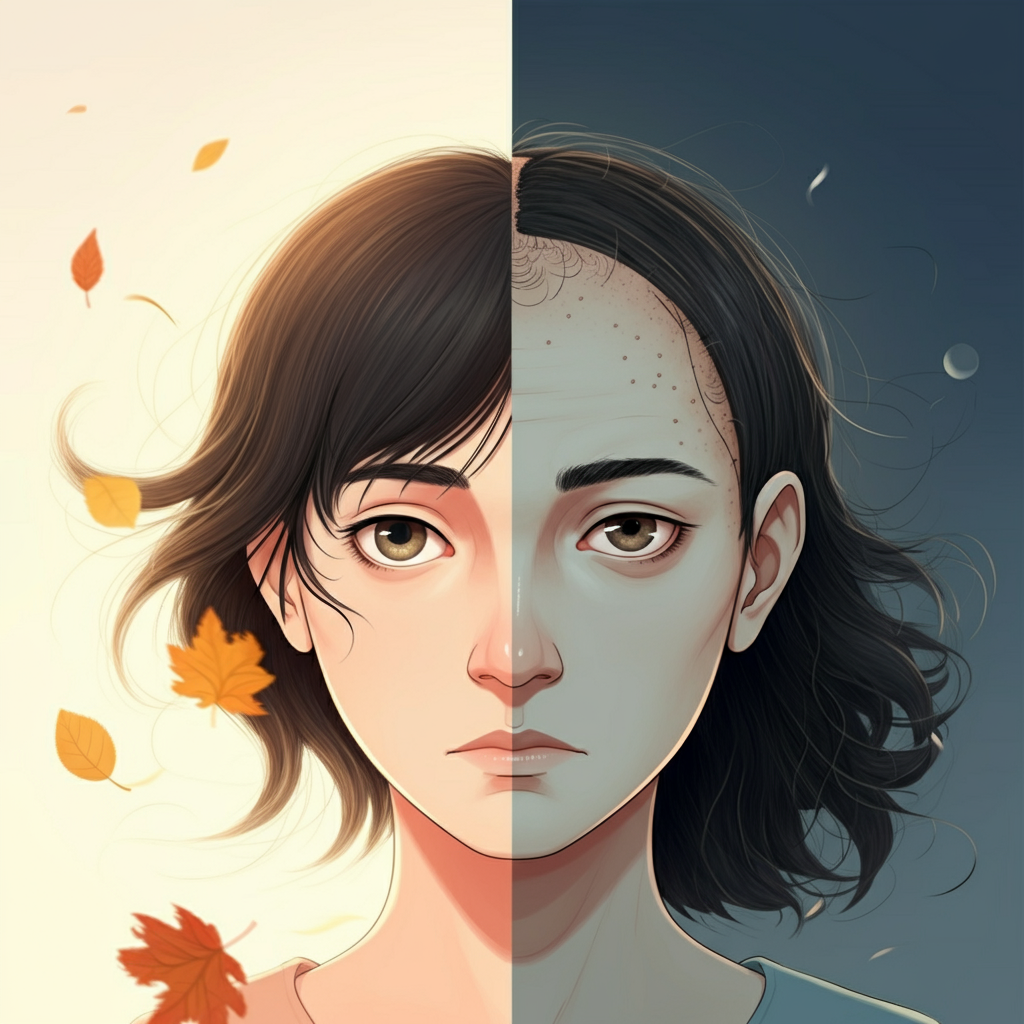
Are you noticing more strands in your brush or waking up to hair all over your pillow? Is it just temporary hair fall, or could it be something more severe, like chronic hair loss? Understanding the distinction between the two is key to tackling the concern head-on. This guide will help you differentiate between hair fall and hair loss, learn their causes, preventions, and treatments, and determine when it’s time to seek professional help.
What Is Hair Fall?
Could your hair fall just be a sign of stress or something temporary?
Hair fall, or hair shedding, refers to the natural cycle of losing hair, which is often completely normal. Our hair goes through a growth cycle consisting of three stages:
- Anagen (growth phase): Lasts about 2-7 years, where your hair actively grows.
- Catagen (transition phase): A short phase of around 10-20 days.
- Telogen (resting phase): The hair rests for a few months before naturally falling out, making room for new growth.
On average, losing about 50-100 strands daily is considered normal. This type of shedding doesn’t typically lead to visible thinning or bald patches, as new hair replaces the ones you’ve lost.
Common Causes of Hair Fall:
- Stress: Emotional or physical stress (like illness or surgery) can disrupt the hair growth cycle, leading to temporary hair fall.
- Diet: Nutritional deficiencies, such as low levels of iron, zinc, or vitamins D and E, often result in increased hair shedding.
- Hormonal Changes: Pregnancy, menopause, or even switching birth control methods can trigger hair fall temporarily.
- Seasonal Shedding: Many people observe increased hair fall during autumn or spring due to changes in temperature and humidity.
Is Hair Fall Reversible?
Yes, in most cases! Once the underlying causes are addressed, hair fall typically stops and regrowth occurs over time.
What Is Hair Loss?
Is your hair thinning over time, and could it indicate something more severe?
Hair loss, on the other hand, is less about temporary shedding and more about persistent or chronic thinning, often leading to noticeable bald patches or a receding hairline. Unlike hair fall, this condition is often more challenging to reverse and requires targeted treatments.
Common Causes of Hair Loss:
- Genetics: Hereditary hair loss (like male or female pattern baldness) is among the most common causes of hair loss.
- Hormonal Imbalances: Disorders like polycystic ovary syndrome (PCOS) or thyroid conditions can lead to prolonged or excessive hair loss.
- Medical Conditions: Diseases such as alopecia areata (where the immune system attacks hair follicles), lupus, or scalp infections can contribute to hair loss.
- Medications: Treatments like chemotherapy or side effects from certain drugs can cause temporary or long-term hair loss.
Is Hair Loss Permanent?
Often, it is. While some forms of hair loss, like telogen effluvium (stress-related shedding), may be temporary, hereditary or autoimmune-related hair loss often requires ongoing medical treatments or intervention to manage effectively.
Key Differences Between Hair Fall and Hair Loss
Can you tell if you’re experiencing hair fall or actual hair loss?
Here are some clear distinctions to help you identify which one you’re dealing with:
| Category | Hair Fall | Hair Loss |
| Patterns | Even shedding across the scalp | Bald patches, thinning at hairline |
| Causes | Stress, diet, seasonal changes | Genetics, medical conditions, hormonal imbalances |
| Duration | Temporary (improves with lifestyle changes) | Chronic or progressive (often permanent) |
| Treatment | Lifestyle adjustments, topical remedies | Specialized medications, surgeries, or therapie |
Tip: Keeping track of how long the shedding has persisted, the volume of hair lost, and whether new hair is growing back can provide insights into whether it’s hair fall or hair loss.
How Can You Prevent or Treat Hair Fall?
What if your hair fall could be stopped with the right habits and treatments?
Good news! Hair fall, in most cases, can be prevented by adopting healthier habits and using targeted remedies.
Practical Tips to Manage Hair Fall:
- Stress Management: Try relaxation techniques like yoga, meditation, or regular exercise to reduce stress levels.
- Nutrition-Rich Diet: Incorporate hair-friendly nutrients like biotin, omega-3 fatty acids, leafy greens, and proteins into your meals.
- Gentle Hair Care Routine: Avoid over-styling, heated tools, or harsh hair products. Opt for sulfate-free shampoos and gentle conditioners.
- Natural Remedies: Scalp massages with oils like coconut, argan, or rosemary can stimulate hair follicles and improve hair quality.
When to See a Doctor for Hair Fall:
If your hair fall persists for over six months despite making lifestyle changes, it might be time to consult a dermatologist.
Can You Reverse Hair Loss?
Is it possible to reverse hair loss, or is it too late for your hair?
While hair loss is more challenging to treat than hair fall, advancements in medical science provide promising solutions:
Treatment Options for Hair Loss:
- Medications:
- Minoxidil (Rogaine): A topical solution approved to treat male and female hereditary hair loss.
- Finasteride (Propecia): An oral pill for men to combat male pattern baldness.
- Surgical Options:
- Hair Transplant Surgery: Effective for restoring hair in bald or thinning areas.
- Scalp Micropigmentation (SMP): A non-surgical treatment for creating the illusion of thicker hair.
- Professional Therapies:
- Platelet-Rich Plasma Therapy (PRP): Stimulates hair regrowth by injecting your blood’s growth-rich platelets into the scalp.
- Laser therapy to improve hair density and stimulate growth.
Importance of Early Intervention:
The earlier hair loss is diagnosed and treated, the better the outcomes. Make note of changes in your hair density to act quickly.
When Should You Seek Professional Help?
When should you stop relying on home remedies and consult an expert about your hair?
Here’s when it’s worth consulting a dermatologist or trichologist:
- Excessive Shedding: Losing over 150 hairs daily for weeks in a row should raise concerns.
- Noticeable Balding or Thinning: Visible scalp or bald spots need immediate attention.
- No Response to OTC Treatments: Home remedies may not work for deeper-rooted issues like hereditary hair loss.
What to Expect During a Hair Consultation:
- Diagnosis: Your specialist may conduct blood tests, scalp biopsies, or perform a close scalp analysis.
- Treatment Plan: Based on your condition, the doctor will provide tailored solutions ranging from medical treatments to lifestyle recommendations.
Your Hair Health Journey Starts Here
Now that you know the difference, which one are you dealing with—temporary hair fall or chronic hair loss? This understanding will empower you to take timely and focused actions, whether it’s tweaking your routine for hair fall or seeking medical attention for hair loss.
Have a personal hair story or tips for managing hair health? Share your experiences in the comments below and join the conversation about healthy, happy hair!







